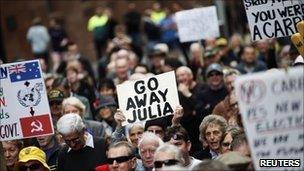Carbon tax divides Australia
- Published

The tax proposals have led to protests
Australia's Prime Minister Julia Gillard is facing a fight to the political death over a carbon tax that has split the nation.
Five hundred of Australia's worst polluters will be forced to pay AU$23 ($25;£15) for each tonne of carbon dioxide they emit under a scheme lauded by environmentalists as historic but condemned as economic madness by conservatives.
The Gillard blueprint aims to cut emissions by at least 5% of 2000 levels - or 160 million tonnes - within a decade. Multi-billion dollar compensation packages for businesses and tax cuts for households are an attempt to sweeten Australia's most comprehensive economic reforms this century.
The sweeteners should secure legislative approval - but only just, thanks to crucial support from a handful of independent MPs and the Greens that gives the Labor government the slimmest of parliamentary majorities.
Ms Gillard is to spend two weeks travelling the country on an election-style road trip selling the pollution levy to a largely sceptical public. If she fails to convince the people, the fate of her government at the next election seems assured.
'What's the point?'
The message the prime minister will deliver is one of environmental imperative.
"We know that that warming is changing our climate causing sea levels to rise, meaning there will be more days of extreme heat, meaning that we are at risk of more bushfires and droughts, meaning that great icons like the Great Barrier Reef are at risk," warned Ms Gillard.
The carbon tax is due to be introduced on 1 July next year, and will then evolve into an emissions trading scheme three years later.
Australians must now consider the biggest question they have faced in a generation. Are these the actions of a bold leader determined to kick-start a new age of clean energy or the reckless charge of a politician who's gambling with Australia's future to try to rescue a fragile minority government?
Tony Abbott, the conservative opposition leader, insists that the levy will wreck Australia's coal-dependent economy, drive up the cost of living for families and force thousands out of work.
"What's the point of all this?" he said.
"It's a tax increase pretending to be an environmental policy. It's socialism masquerading as environmentalism."
Business groups and the powerful mining sector also believe the Gillard plan is flawed and will erode Australia's prosperity, while others cast doubt on the government's predictions that most Australians will be no worse off under the levy.
"Australia has lost its manufacturing, all but lost its agriculture, it's lost its tourism industry," said North Queensland independent MP Bob Katter.
"We did have the mining industry, now we do not have a mining industry... the final nail in the coffin was banged in today with this tax."
The gulf in opinion seems as wide as Australia itself. Supporters of the carbon scheme believe a country that is one of the world's worst-per-capita emitters of greenhouse gases is finally on the road to environmental salvation.
"This price on pollution will be seen as an environmental milestone by future generations," said Dr Jonathan King, a historian and member of the Greens.
"They will look back and say: 'Thank God those people in 2011 could see that we were going to suffer if that pollution continued.' It is a turning point in Australian history."
Other conservations worry, though, that a 5% cut in emissions reduction by 2020 is not enough and were hoping for a far higher target of between 25% and 40%.
But for Tony Windsor, an independent MP whose support is keeping the Gillard government alive, the carbon tax should be applauded.
"It's not about me being re-elected, or who's going to be the prime minister," he said
"This is about the history of people, most of whom haven't even been born yet. And if I'm sacked from politics because of that, well, I'll remove myself with a smile on my face."
- Published10 July 2011
- Published23 March 2011
- Published30 May 2011
- Published30 May 2011